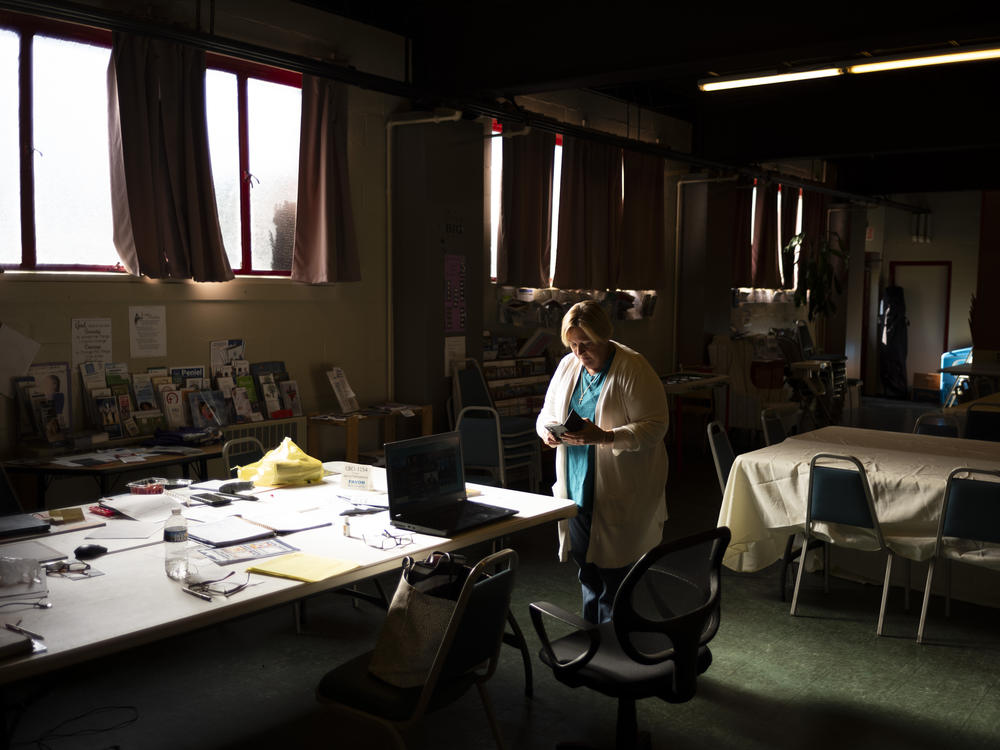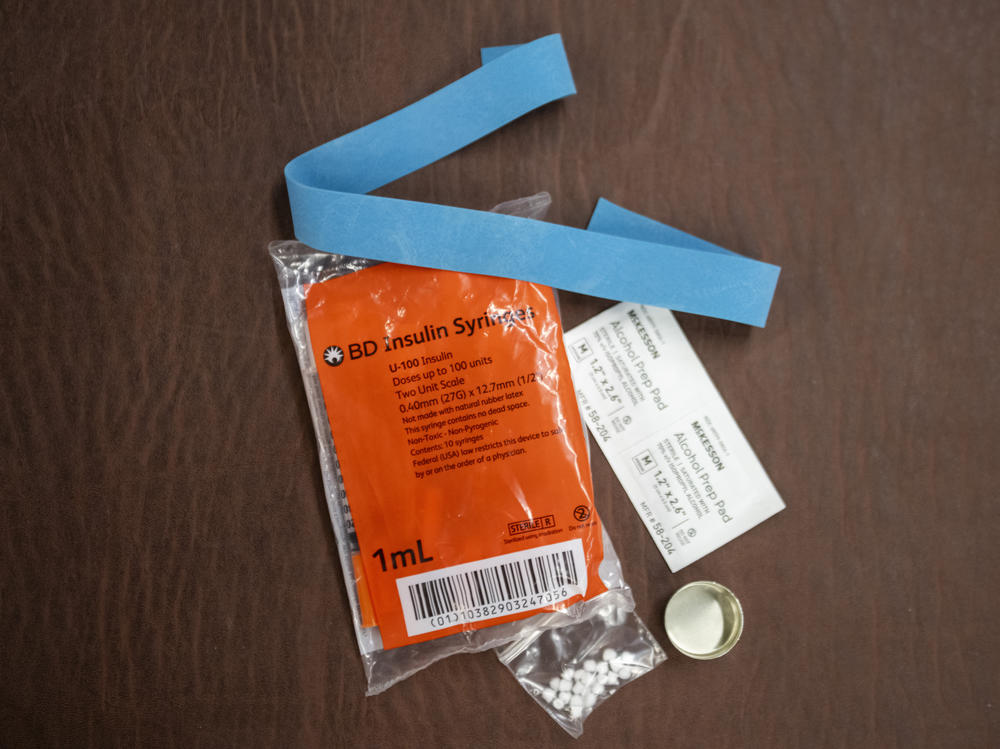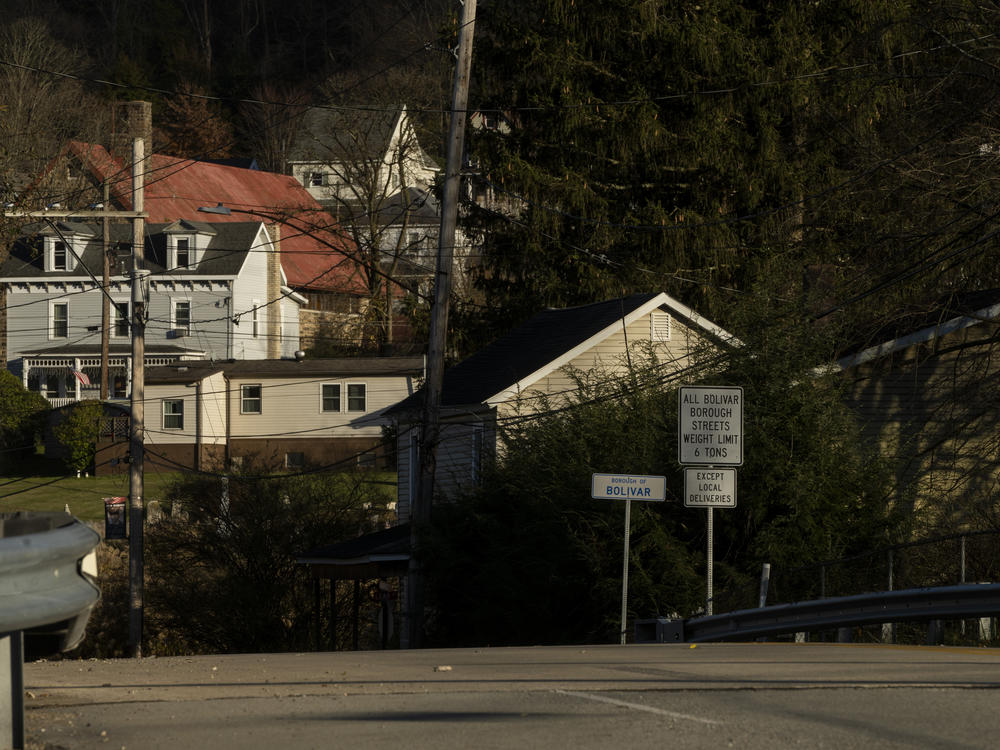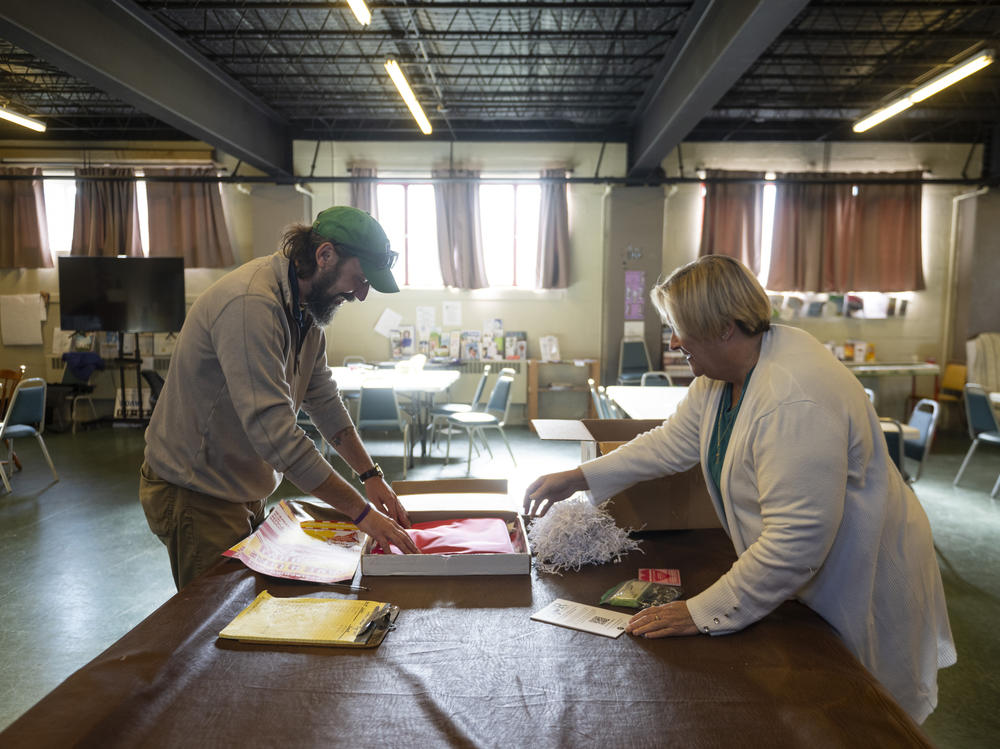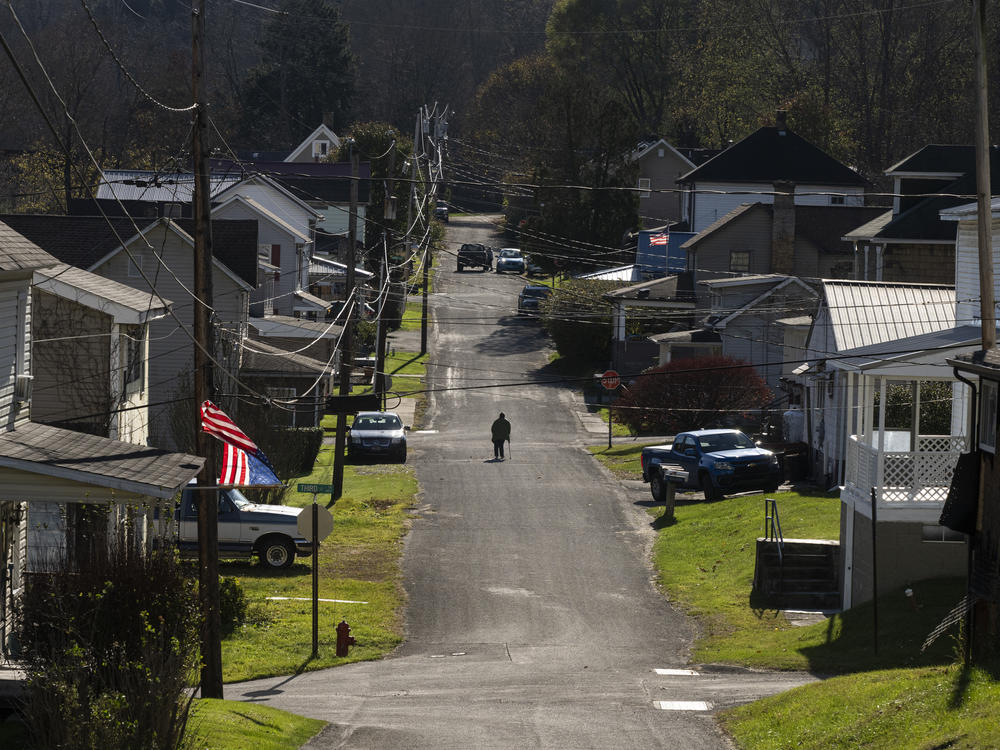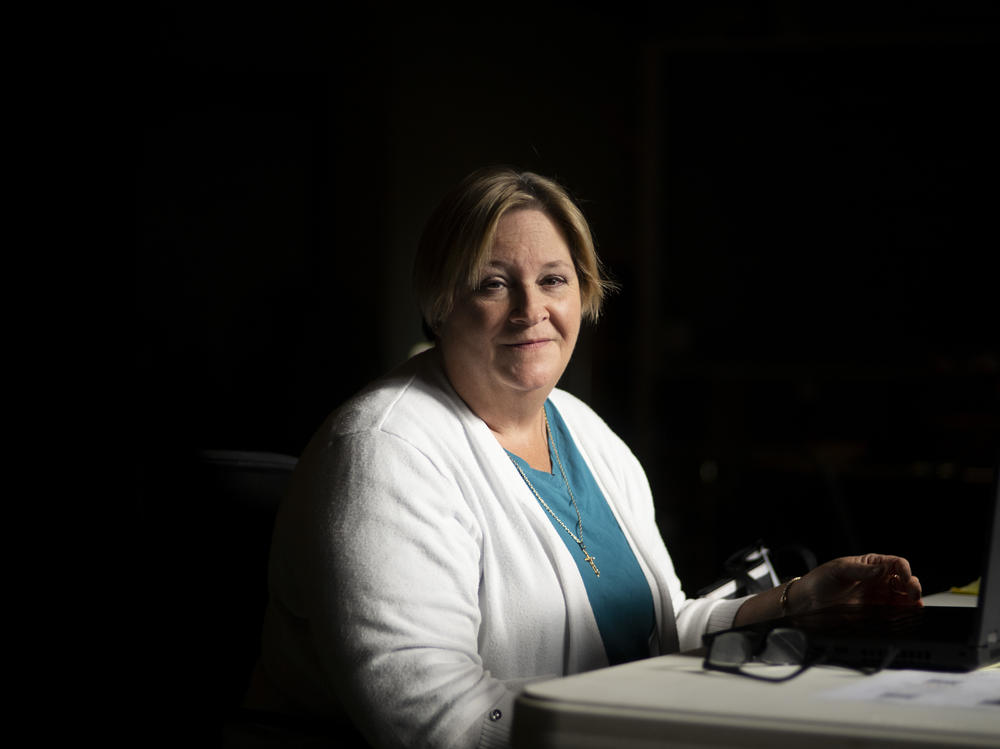Section Branding
Header Content
In Pennsylvania, she wants to hand out new syringes to save lives. But is it legal?
Primary Content
Kim Botteicher hardly thinks of herself as a criminal.
On the main floor of a former Catholic church in Bolivar, Pennsylvania, Botteicher runs a flower shop and cafe.
In the church's basement, she also operates a nonprofit focused on helping people caught up in the ongoing drug epidemic get back on their feet.
Botteicher founded the nonprofit, FAVOR ~ Western PA, in this rural pocket of the Allegheny Mountains, east of Pittsburgh.
For each of the past several years, the nonprofit's home county of Westmoreland has seen more than 100 drug overdose deaths, the majority involving fentanyl.
Thousands more in the region have been touched by the scourge of addiction, which is where Botteicher comes in.
She helps people find housing, jobs, and health care, and works with families by running support groups and explaining that substance use disorder is a disease, not a moral failing.
But she has also talked publicly about how she has made sterile syringes available to people who use drugs.
"When that person comes in the door," she said, "if they are covered with abscesses because they have been using needles that are dirty, or they've been sharing needles, maybe they've got Hep C, we see that as, 'Okay, this is our first step.'"
The proven health benefits of syringe exchanges
Many studies have identified public health benefits associated with syringe-exchange services. The Centers for Disease Control and Prevention says these programs reduce HIV and hepatitis C infections, and that new users of the programs are more likely to enter drug treatment and more likely to stop using drugs.
This harm-reduction strategy is supported by leading health groups, such as the American Medical Association, the World Health Organization, and the International AIDS Society.
But for Botteicher, providing clean syringes could put her in legal danger. Under Pennsylvania law, it's a misdemeanor crime to distribute drug paraphernalia. The state's definition includes hypodermic syringes, needles, and other objects used for injecting banned drugs.
Those working on the front lines of the epidemic, like Botteicher, say a re-examination of this law is long overdue.
There's an urgency to the issue as well: Billions of dollars have begun flowing into Pennsylvania and other states from legal settlements with companies involved in the opioid epidemic, and syringe services are among the eligible interventions that could be supported by that money.
Syringe services in Pennsylvania: vital and unauthorized
Included in the opioid settlements reached between drug companies and distributors, and a coalition of state attorneys general, were recommended strategies for spending the money, including programs described as evidence-based. Expanding syringe services is listed as one of the core strategies.
But in Pennsylvania, where 5,158 people died from a drug overdose in 2022, the state's drug paraphernalia law stands in the way.
Concerns over Botteicher's work with syringe services recently led Westmoreland County officials to cancel $150,000 in opioid settlement funds they had previously approved for her nonprofit. County Commissioner Douglas Chew defended the decision by saying the county "is very risk-averse."
Botteicher had planned to use the money to hire additional recovery specialists, not on syringes, she says. Supporters of syringe services point to this incident as evidence of the need to change state law, especially given the recommendations of settlement documents.
"It's just a huge inconsistency," said Zoe Soslow, who leads overdose prevention work in Pennsylvania for the public health organization Vital Strategies. "It's causing a lot of confusion."
Pennsylvania is one of 12 states that do not implicitly or explicitly authorize syringe services programs through statute or regulation, according to a recent analysis.
Though sterile syringes can be purchased from pharmacies without a prescription, handing out free ones to make drug use safer is generally considered illegal — or at least in a gray area — in most of the state. (In Pennsylvania's two largest cities, Philadelphia and Pittsburgh, officials have used local health powers to provide legal protection to people who operate syringe services programs.)
In Philadelphia, Mayor Cherelle L. Parker, who took office in January, has made it clear she opposes using opioid settlement money, or any other city funds, to pay for the distribution of clean needles, according to reporting by The Philadelphia Inquirer. This move signals a major shift in that city's approach to the opioid epidemic.
But on the other side of the state, opioid settlement funds have had a big impact for Prevention Point Pittsburgh, which last year received $325,000 in settlement funds from Allegheny County to support its syringe services work.
"It was absolutely incredible to not have to fundraise every single dollar for the supplies that go out," said Prevention Point's executive director, Aaron Arnold. "It takes a lot of energy. It pulls away from actual delivery of services when you're constantly having to find out, 'Do we have enough money to even purchase the supplies that we want to distribute?'"
In parts of Pennsylvania that lack these legal protections, people sometimes operate underground syringe programs.
The Pennsylvania law banning drug paraphernalia was never intended to apply to syringe services, argues Scott Burris, director of the Center for Public Health Law Research at Temple University. But there have not been court cases in Pennsylvania to clarify the issue, and the failure of the legislature to act creates a "chilling effect," he said.
Carla Sofronski, executive director of the Pennsylvania Harm Reduction Network, said she's not aware of anyone ever facing criminal charges for doing so in the state, but noted the threat hangs over them, and they are taking a "great risk."
Widespread need outside the biggest cities
Three Pennsylvania counties — Cambria, Crawford, and Luzerne — were flagged among 220 counties in a national assessment of communities potentially vulnerable to the rapid spread of HIV and new or continuing high rates of hepatitis C infections among people who inject drugs. The analysis from the CDC was published in 2016.
Luzerne County resident Kate Favata said she started using heroin in her late teens and wouldn't be alive today if it weren't for the support and community she found at a syringe services program in Philadelphia.
"It kind of just made me feel like I was in a safe space. And I don't really know if there was like a come-to-God moment or come-to-Jesus moment," she said. "But ... I just wanted better."
Favata is now in long-term recovery and works for a medication-assisted treatment program.
At a clinic in Cambria County, Highlands Health provides free and charitable medical care. Despite the legal risk, the organization has operated a syringe program for several years, while also testing patients for infectious diseases, distributing overdose-reversal medication, and offering recovery options.
Rosalie Danchanko, Highlands Health's executive director, said she hopes opioid settlement money can eventually support her organization.
"Why shouldn't that wealth be spread around for all organizations that are working with people affected by the opioid problem?" she asked.
New efforts to change state law
In February, legislation to legalize syringe services in Pennsylvania was approved by a committee and has moved forward. Democratic Gov. Josh Shapiro's administration supports the legislation. But it faces an uncertain future in the full legislature, where Democrats have a narrow majority in the House, and Republicans control the Senate.
The bill's lead sponsor, state Rep. Jim Struzzi, hasn't always supported syringe services. But the Republican from western Pennsylvania says that since his brother died from a drug overdose in 2014, he's come to better understand the nature of addiction.
During the committee vote, most of Struzzi's Republican colleagues opposed the bill. State Rep. Paul Schemel said authorizing the "very instrumentality of abuse" crossed a line for him and "would be enabling an evil."
After the vote, Struzzi's goal is to build more bipartisan support. He noted that some of his own skepticism about the programs only eased after he visited Prevention Point Pittsburgh, and saw how workers do more than just hand out syringes. These types of programs connect people to resources — overdose reversal medication, wound care, substance use treatment, and other services— that can save lives and lead to recovery.
"A lot of these people are ... desperate, they're alone, they're afraid. And these programs bring them in to someone who cares," Struzzi said. "And that to me is a step in the right direction."
Botteicher is hoping lawmakers take action.
"If it's something that's going to help someone, then why is it illegal?" she said. "It just doesn't make any sense to me."
This story was co-reported by WESA Public Radio and Spotlight PA, an independent, nonpartisan, and nonprofit newsroom producing investigative and public-service journalism that holds power to account and drives positive change in Pennsylvania.
It was produced as part of NPR's health reporting partnership with KFF Health News.
Bottom Content

